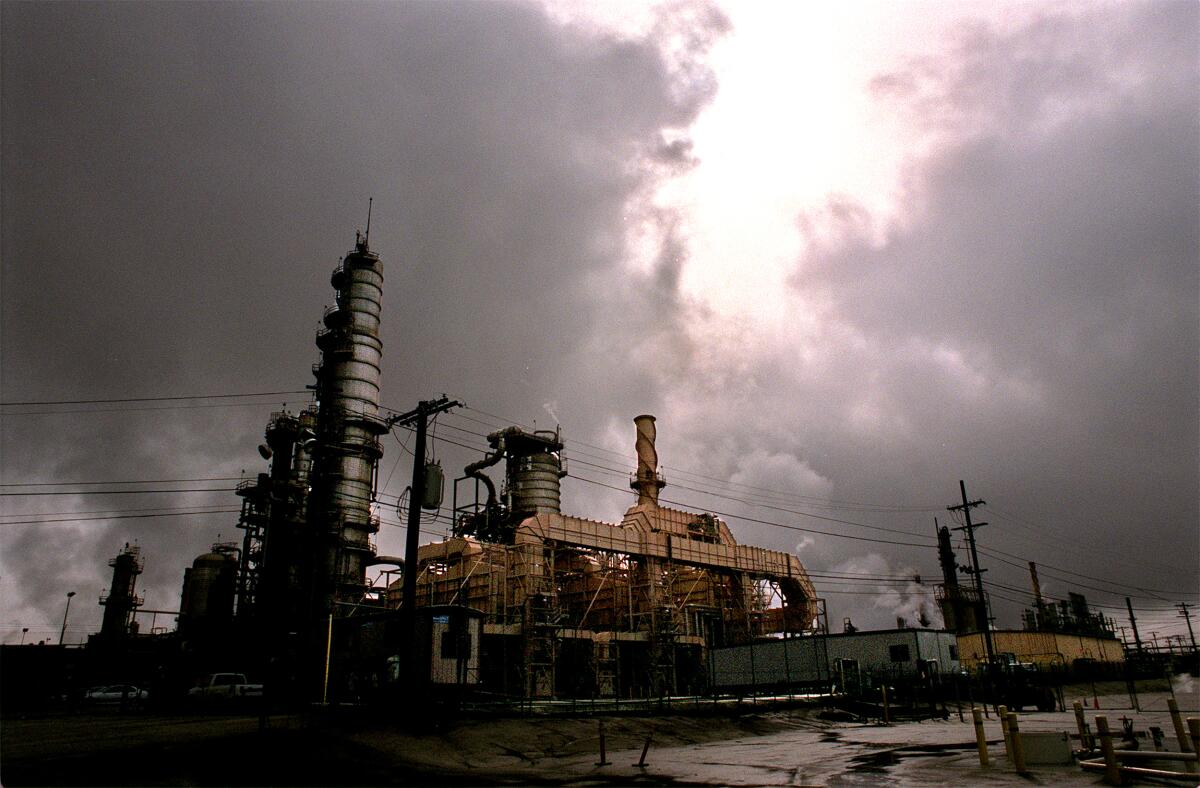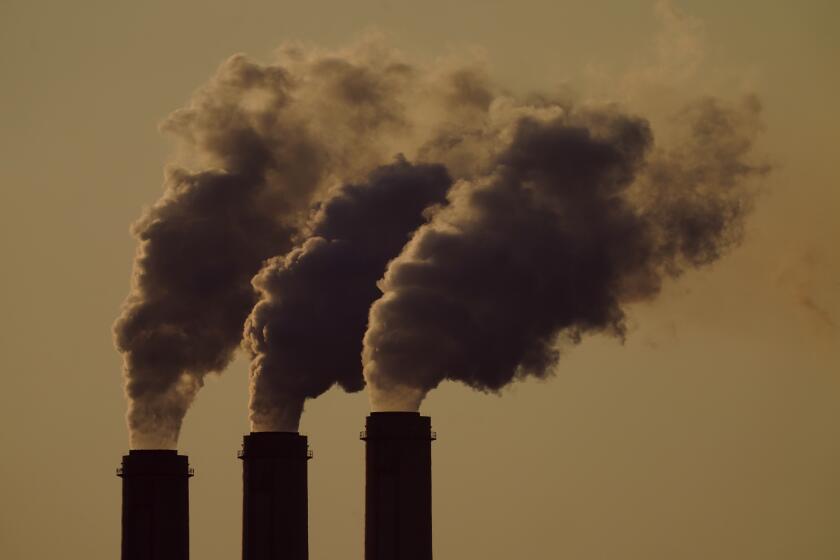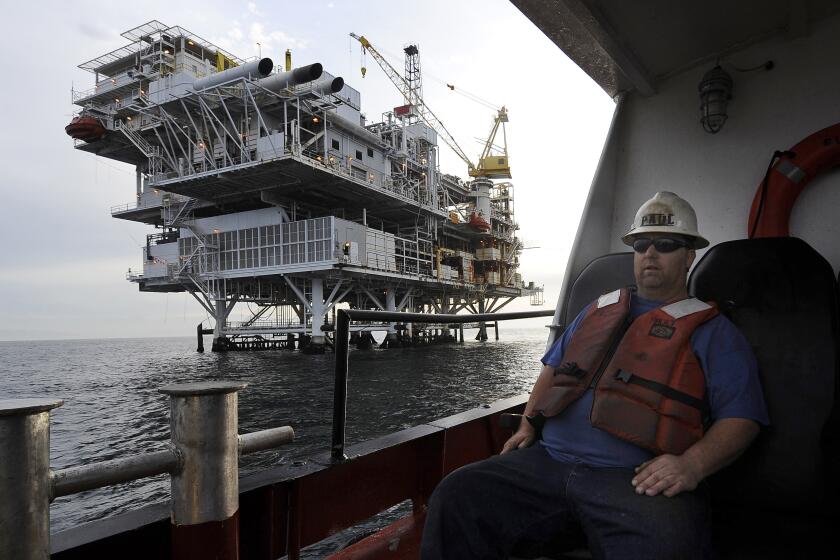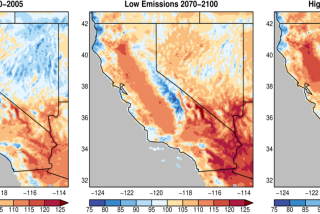Op-Ed: Will Congress expose Big Oil like it did Big Tobacco in the ’90s?

On Thursday, executives from six major oil and gas corporations and trade associations — collectively dubbed the “Slippery Six” by advocates — will testify to Congress about their decades of climate denial and propaganda. The House Oversight Committee’s hearing, led by Reps. Carolyn Maloney (D-N.Y.) and Ro Khanna (D-Fremont), will consider testimony from leaders at ExxonMobil Corp, BP America, Chevron Corp. and Shell Oil, alongside the presidents of the U.S. Chamber of Commerce and American Petroleum Institute.
The outcome will be one indication of whether the fossil fuel industry’s lobbying-fueled stranglehold on science-based decision-making can be loosened in time to meaningfully confront the climate crisis. Twenty-seven years ago, similar hearings featuring tobacco industry executives led to litigation by 52 U.S. states and territories and industry restitution to the public. The stakes this time are at least as high: trillions of dollars in predicted loss and destruction from climate change. Big Oil is due its Big Tobacco moment.
A U.N.-backed study says the world must cut its production of coal, oil and gas by more than half in the coming decade to hit global warming targets.
In 1994, tobacco executives stood before Congress and lied about the addictiveness of their products. The hearings had a ripple effect. As the tobacco industry’s history of deceit and harmful products was laid bare, its public credibility crumbled. Further legal action against tobacco companies ensued, most notably the Master Settlement Agreement four years later, which required the industry to pay out a minimum of $206 billion over the next 25 years. Laws were passed to curb youth addiction, and smoking rates fell.
Though insufficient to redress the lives lost, livelihoods ruined and staggering healthcare costs of tobacco, especially among low-income communities and communities of color, the agreement set a precedent for Congress to investigate an industry network that has misled the public and policymakers in an effort to deny the dangers of its products and derail regulation. The MSA required corporations to absorb some of their “externalized costs” for society, and complementary litigation yielded millions of damning internal documents.
This week lawmakers have a similar opportunity to accelerate corporate accountability, legal scrutiny and political progress — this time on the climate crisis. Over the past seven years, journalists and scholars (including one of us) have uncovered overwhelming evidence that ExxonMobil, Shell, Total, the American Petroleum Institute, the coal industry and other groups invested in fossil fuels have known for decades that their products could cause dangerous global warming. Yet, rather than warning the public or taking action, they waged disinformation and lobbying campaigns in efforts to mislead the public and undermine climate policies. From strategy to networks to personnel and rhetoric, these efforts to deny and delay come straight from Big Tobacco’s playbook.
In fact, Massachusetts, Rhode Island, Minnesota, the District of Columbia, New York City and over 20 other cities and counties have already sued ExxonMobil and other fossil fuel corporations for fraud, damages or denial. Advocates around the world are also pursuing legislative and regulatory action beyond the courtroom, such as establishing ecocide as an international crime.
In some cases, attribution science, which can assess the impact of global warming on extreme weather and trace emissions and climate damages to corporations, is making it easier to quantify the economic damages owed. In recent decades, nearly two-thirds of greenhouse gas emissions, more than 40% of temperature rise and more than 25% of sea level rise trace back to 90 major industrial carbon producers.
The House has included common-sense oil and gas reforms in its version of the ‘Build Back Better’ Act. The Senate should follow suit.
The oil executives will likely do everything in their power to deflect attention away from this record. But members of Congress should force the CEOs to make a choice: Admit to their companies’ lies and risk further exposing themselves to legal scrutiny, or lie about past lies on climate science — a path in line with Big Tobacco’s undoing.
Historical parallels to tobacco industry tactics suggest that fossil fuel bosses may try to avoid getting caught in their own web of denial by calling climate change a “risk,” rather than what it is: real and human-caused. Tobacco historian Robert Proctor calls this hedging strategy “a kind of legal having-it-both-ways: an admission strong enough to ward off accusations of having failed to warn, yet weak enough to exculpate from charges of having marketed a deadly product.”
Expect also to see the Slippery Six shifting blame away from themselves and onto consumers by presenting the fossil fuel industry as an innocent supplier simply satisfying customer demand, and by positioning oil and gas companies as trustworthy innovators to be relied upon to invent silver bullet techno-fixes for this crisis. Front and center will be companies’ “net zero” pledges, which are inconsistent with the Paris agreement’s goal of holding global warming below 1.5 degrees Celsius, and which rely on economically unproven negative emissions technologies and offset schemes.
These messages of individualized responsibility and fossil fuels as the solution yield a “fossil fuel savior” framing of the climate crisis — again reflecting the playbook of Big Tobacco, which blames customers for choosing to smoke.
Lawmakers must see through Big Oil’s smoke and mirrors. As many politicians work tirelessly to build back greener and more equitably, let Thursday be the moment when they begin to take on the fossil fuel forces standing in the way.
Patti Lynn is executive director of Corporate Accountability, a nonprofit. Geoffrey Supran is a research fellow in the Department of the History of Science at Harvard University and director of climate accountability communication for the Climate Social Science Network.
More to Read
A cure for the common opinion
Get thought-provoking perspectives with our weekly newsletter.
You may occasionally receive promotional content from the Los Angeles Times.












